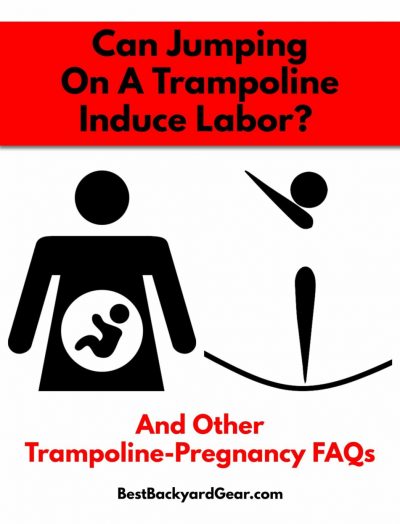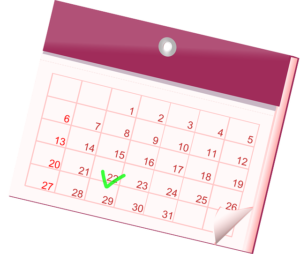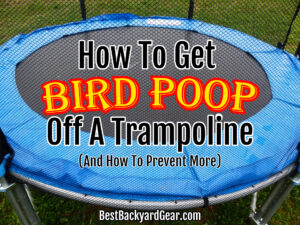If you’re exhausted from pregnancy and ready to meet your little one, no doubt you’re looking for things that will kickstart the process. If you’re wondering “can jumping on a trampoline induce labor?”, you aren’t alone! It’s a popular question. There are a lot of questions about pregnancy and trampolines, actually. We’ll look at a bunch of them here today.
Table Of Contents
- Can Jumping On A Trampoline Induce Labor?
- Why Is Bouncing On An Exercise Ball Ok For Inducing Labor, But Not A Trampoline?
- Can Bouncing On A Trampoline Cause A Breeched Baby To Turn?
- When Is Bouncing On A Trampoline Ok During Pregnancy?
- Is A Rebounder Trampoline Safer Than A Full Size Backyard Trampoline?
- How Does Pregnancy Affect Your Sense Of Balance? (And Why Does It Matter?)
- Does Bouncing On A Trampoline While Pregnant Make You Pee?
- Is Jumping On A Trampoline While Pregnant Known To Cause Miscarriages?

Can Jumping On A Trampoline Induce Labor?
 While there is no scientific evidence to suggest that bouncing on a trampoline can induce labor, some women have reported that the activity has helped to bring on contractions.
While there is no scientific evidence to suggest that bouncing on a trampoline can induce labor, some women have reported that the activity has helped to bring on contractions.
However, it is very important to note that bouncing on a trampoline during pregnancy and especially during the late stages also carries some pretty big risks, including the potential for falls and strains.
Inducing labor before the baby is fully developed can lead to complications and health risks for both the mother and the baby. Yes, usually women who are trying to induce labor are at that point, but medical professionals ALWAYS recommend you let your baby tell you when it’s ready.
If you are nearing your due date and are considering ways to naturally induce labor, it is always best to consult with your healthcare provider to discuss the safest options for you and your baby – very likely he or she is NOT going to recommend you have a bounce session in your backyard trampoline or home gym mini trampoline.
Why Is Bouncing On An Exercise Ball Ok For Inducing Labor, But Not A Trampoline?
 Bouncing on an exercise ball and bouncing on a trampoline are two different activities that have different effects on your body, particularly if you are heavily pregnant.
Bouncing on an exercise ball and bouncing on a trampoline are two different activities that have different effects on your body, particularly if you are heavily pregnant.
Bouncing on an exercise ball is a gentle activity that involves moving up and down on a large, soft, inflatable ball. This can help stimulate your pelvic muscles, which in turn helps to encourage your baby to move into the pelvis and prepare for labor.
As long as you’re doing it in a controlled, comfortable manner, keeping the movement low impact and gentle, bouncing on an exercise ball is generally considered a safe and effective way to help induce labor naturally.
On the other hand, bouncing on a large trampoline involves jumping and bouncing on a springy surface, which can cause sudden and unpredictable movements, especially if the trampoline is a bit wet. This can increase your risk of falls or injuries, especially because when you’re pregnant your center of gravity and balance is “off”. The impact of bouncing on a trampoline can also put additional stress on your body, which isn’t something you want during pregnancy, and especially as you move towards the Big Event.
So while both activities involve bouncing, the intensity and impact of the activity are quite different between an exercise ball and a trampoline. Steer clear of trampolines, especially near your due date, but go ahead and get out your exercise ball.
Can Bouncing On A Trampoline Cause A Breeched Baby To Turn?
There is no scientific evidence to suggest that bouncing on a trampoline can cause a breech baby to turn. While some activities and exercises may help to encourage a breech baby to turn, such as pelvic tilts and gentle stretching, trampolining is not among them.
If you are pregnant and concerned about the position of your baby, it is always best to consult with your healthcare provider.
When Is Bouncing On A Trampoline Ok During Pregnancy?
While it is never a good idea to go “all out” on a trampoline if you know you’re pregnant, there are stages during those nine months when you can still enjoy a bit of fun and careful exercising on a trampoline. It is important to continue exercising during pregnancy.
Early Stage Of Pregnancy
 During early pregnancy (your first trimester), it is generally safe to jump on a trampoline as long as you feel comfortable and have not been advised otherwise by your doctor. However, it is important to take into account the risk of falls and impact on your joints, which are beginning to loosen.
During early pregnancy (your first trimester), it is generally safe to jump on a trampoline as long as you feel comfortable and have not been advised otherwise by your doctor. However, it is important to take into account the risk of falls and impact on your joints, which are beginning to loosen.
You may not even be interested in bouncing at this time if you are experiencing symptoms such as nausea or fatigue. And that’s ok! Listen to your body.
Middle Stage Of Pregnancy
During mid-pregnancy, jumping on a trampoline (especially a full size backyard trampoline) can become more challenging and the risks increase a LOT. Your center of gravity shifts as your belly grows, making it harder to maintain balance and putting you at a higher risk of falls.
If bouncing on a trampoline is a big part of your regular exercise routine though, consult with your healthcare provider early on. He/she may recommend using a grab bar on your rebounder, or unfortunately that you move to another, lower-impact exercise routine for the next few months.
Late Stage Of Pregnancy
During late pregnancy (third trimester), jumping on a trampoline is generally not recommended. Your body is undergoing many changes, including increased weight gain and hormonal fluctuations, which can make you more prone to accidents and injuries. Additionally, as your due date approaches, your cervix may begin to dilate and jumping on a trampoline can cause undue pressure and potentially induce early labor.
Is A Rebounder Trampoline Safer Than A Full Size Backyard Trampoline If You Are Pregnant?
 Rebounder trampolines are typically smaller and lower to the ground than full-size backyard trampolines, and are often designed for indoor use. Because of their smaller size and lower height, rebounders may be less risky for you to use if you’re pregnant than full-size trampolines.
Rebounder trampolines are typically smaller and lower to the ground than full-size backyard trampolines, and are often designed for indoor use. Because of their smaller size and lower height, rebounders may be less risky for you to use if you’re pregnant than full-size trampolines.
Rebounder trampolines are generally considered to be lower-impact than full-size trampolines, but they can still cause strain on your joints and may not be the best choice for you if you are experiencing joint, nerve, or muscle discomfort or are dealing with nausea or fatigue.
Ultimately, whether or not bouncing on a rebounder trampoline is safe for you to use when you’re pregnant will depend on a number of individual factors, including your overall health, the stage of your pregnancy, and any pre-existing medical conditions you might have.
As always, it is important to consult with a healthcare provider before starting any new exercise routine during pregnancy.
Post Partum: Get Back On The Rebounder!
Want to strengthen those pelvic floor muscles and get back into shape after your beautiful baby is born? Give yourself time to heal first. Don’t start immediately, but after approximately 12 weeks, you can get out your mini trampoline again and start a workout using it that will get your cardio kickstarted and your muscles toning again. Here’s an example of how it can look:
How Does Pregnancy Affect Your Sense Of Balance? (And Why Does It Matter?)
Pregnancy can have a significant impact on your sense of balance due to changes in your center of gravity and the loosening of your ligaments and joints. As your uterus grows and the baby develops, your weight distribution shifts forward. This can make you feel more off-balance and unstable than normal.
The hormone relaxin, which is produced during pregnancy, can also cause your ligaments and joints to become more flexible and move differently than they did before you were pregnant (and this can throw you a bit off balance too).
Why does this matter, when we’re looking at trampoline bouncing? Because a sense of instability and loss of balance combined with repeated bouncing on a trampoline’s stretchy, responsive mat increases your risk of falling or straining muscles. And this can be especially dangerous for pregnant women.
Does Bouncing On A Trampoline While Pregnant Make You Pee?
 Unfortunately, the answer to this question is yes, bouncing on a trampoline can sometimes cause you to pee a little bit when you’re pregnant. I know, it’s not exactly the glamorous side of pregnancy that you were hoping for. But don’t worry… if it happens to you, you are not alone in this!
Unfortunately, the answer to this question is yes, bouncing on a trampoline can sometimes cause you to pee a little bit when you’re pregnant. I know, it’s not exactly the glamorous side of pregnancy that you were hoping for. But don’t worry… if it happens to you, you are not alone in this!
Many pregnant women experience bladder control issues during their pregnancies, especially as the baby grows and puts more pressure on your bladder, and as your pelvic floor muscles weaken.
So, if you’re planning on bouncing on a trampoline while pregnant (and as you’ve been reading here, it’s not advised), make sure to wear a panty liner or even a maternity pad just in case. And don’t be embarrassed about it – it’s completely normal and nothing to be ashamed of!
Is Jumping On A Trampoline While Pregnant Known To Cause Miscarriages?
There is no clear scientific evidence to suggest that jumping on a trampoline can cause miscarriages. However, high-impact activities like trampolining may carry a risk of injury, and those injuries definitely will increase the risk of miscarriage.
For example, falls or impacts during trampolining could cause trauma to the abdomen or placenta, which could potentially harm the developing fetus or disrupt a healthy pregnancy.
As a precaution, many healthcare providers generally recommend that pregnant women avoid high-impact activities like bouncing on a trampoline during pregnancy simply because the risk is too high.
If you have any concerns about the safety of a particular activity during pregnancy, it is always best to consult with your healthcare provider.
Key Takeaways
In the end, because a mother wants what is best for her unborn child, she won’t want to take unnecessary risks. While jumping on a trampoline MAY induce labor, the potential for injury makes it not a good idea. All things considered, jumping on a trampoline isn’t smart or very safe during any stage of pregnancy.




